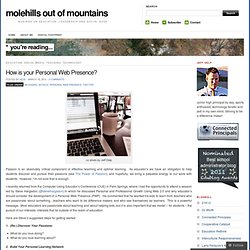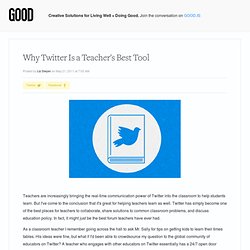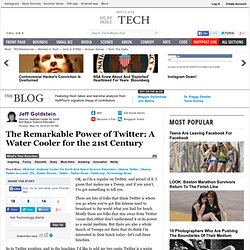

How is your Personal Web Presence? Cc photo by Jeff Delp Passion is an absolutely critical component of effective teaching and optimal learning.

As educator’s we have an obligation to help students discover and pursue their passions (see The Power of Passion), and hopefully, we bring a palpable energy to our work with students. However, I’m not sure that is enough. I recently returned from the Computer Using Educator’s Conference (CUE) in Palm Springs, where I had the opportunity to attend a session led by Steve Hargadon (@stevehargadon) in which he discussed Personal and Professional Growth Using Web 2.0 and why educator’s should consider the development of a Personal Web Presence (PWP). He commented that he wanted his kids to learn from teachers who are passionate about something…teachers who want to be difference makers and who see themselves as learners.
Here are Steve’s suggested steps for getting started: 1. What do you love doing? 2. Who do you learn from? 3. 4. What are your emotional or practical barriers? 5. 6. Who’s Dan Meyer? Math Establishment: Who’s Dan Meyer?

Other: Some crazy young punk educator with radical notions about how we should teach math to kids. Math Establishment: No worries. His ideas won’t go far… Math Establishment: Wow. This guy’s got some following. Could this happen in the past? On the Web we can write (and podcast and video and Tweet…) ourselves into existence. Using Twitter makes you smarter say Irish scientists. Twitter makes you smart - who knew!

Photo by: Google Images Who says spending hours on the computer is bad for your mental health? Not researchers at Trinity College Dublin, who just published their findings which showed that people who use social media outlets like Facebook, Twitter, and LinkedIn are making themselves more intelligent in the process. The Irish version of the “Sunday Times” in the U.K. reported that the researchers discovered a link between human social interaction and smartness. Those who interact more on a social level – even via the Internet – are also increasing their intelligence levels. The “Times” says that the researchers – led by Trinity professor Andrew Jackson and a PhD student, Luke McNally – built a digital organism, a computer system with 50 to 100 neural networks, each of which represented a human brain with the ability to decide. Why Twitter Is a Teacher's Best Tool - Education. Teachers are increasingly bringing the real-time communication power of Twitter into the classroom to help students learn.

But I've come to the conclusion that it's great for helping teachers learn as well. Twitter has simply become one of the best places for teachers to collaborate, share solutions to common classroom problems, and discuss education policy. In fact, it might just be the best forum teachers have ever had. As a classroom teacher I remember going across the hall to ask Mr. Sally for tips on getting kids to learn their times tables. Educators can also use Twitter to keep up with education policy. Not all teachers have totally embraced Twitter. Guardian Professional. When our blogger went back to Twitter he found a world of opportunities to collaborate with other teachers and beyond.

Photograph: Iain Masterton / Alamy/Alamy I signed up for Twitter several years ago but struggled to understand the point. What is it? What is it for? What information can I share in 140 characters? Then, as the site grew in popularity, I decided to give it another chance. As time went on I began to take tweeting more seriously, posting more about technology and educational issues. Jeff Goldstein: The Remarkable Power of Twitter: A Water Cooler for the 21st Century. OK, so I'm a regular on Twitter, and proud of it.

I guess that makes me a Tweep, and if you aren't, I've got something to tell you. There are lots of folks that think Twitter is where you go when you've got this intense need to broadcast to the world what you had for lunch. Mostly these are folks that stay away from Twitter 'cause they either don't understand it or its power as a social medium. But there are also a whole bunch of Tweeps out there that do think I'm interested in their lunch today--let's call them lunchies. So to Twitter avoiders, and to the lunchies, I'd like to add my two cents. Twitter allows countless users (yes, the Tweeps) to send their messages (Tweets) into the cyber aether, forming an immense Public Stream. But to be part of a social community, you can't just watch the messages flow by. Recently I looked back at my archive of Tweets that I've sent over the months, and some (at least to me) seem funny, compelling .... why, even thought-provoking.
Some Tweetisms. Twitter, professional identity, and the 1st Amendment – Educational Insanity. On Sunday (Easter) morning, I noticed a bunch of public school educators who I follow posting religious material on Twitter. The posts ranged from a simple “He is risen!” To longer passages from the Bible to links to live streams of religious ceremonies. In response, here’s what I posted: That was a not-so-subtle nod to the Establishment Clause of the First Amendment. I am not stating definitively that public school educators are in violation of that clause by tweeting scripture, but I do believe there is an argument to be made. Many, many public school educators have made claims to the effect of “Twitter is the best source of professional development I’ve ever known…” Or, “Twitter is an amazing part of my personal/professional learning network (PLN)…” These same folks participate in education-related Twitter chats, use Twitter to announce blog posts related to education, etc.